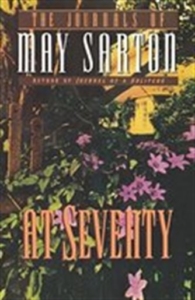 “What is it like to be seventy?” May Sarton asks on her seventieth birthday, May 3, 1982. Her book, At Seventy: A Journal, was published in 1984 and it was the first book I wanted to buy with a gift card from my son and his wife when I celebrated my seventieth birthday last July.
“What is it like to be seventy?” May Sarton asks on her seventieth birthday, May 3, 1982. Her book, At Seventy: A Journal, was published in 1984 and it was the first book I wanted to buy with a gift card from my son and his wife when I celebrated my seventieth birthday last July.
Just back from giving a month of poetry readings, May recalls telling an audience, “This is the best time of my life. I love being old.” When questioned by an audience member, she answers spontaneously: “Because I am more myself than I have ever been.”
I would say the same about myself, that is, being more myself than I’ve ever been. Being seventy is an opportunity to assess what no longer fits and embrace more of what nourishes. I can also relate when May says: “One thing is certain, and I have always known it – the joys of my life have nothing to do with age. They do not change. Flowers, the morning and evening light, music, poetry, silence, the goldfinches darting about . . . “
In November of the year she turned seventy, May reflects on a trip to Victoria, B.C. where a film about her was shown. She mentions the women who arranged book signings and a reading and the poets she was reading. One of them was P. K. Page who had left her new book for May: Evening Dance of the Grey Flies. (The photo to the left is of P. K. Page.)
In Vancouver, May did a book signing at Ariel where she “had the joy of seeing Audrey Thomas again.” She wrote: “Some years ago we had done a reading together in Toronto.” That reading was probably the one I attended in the auditorium at OISE (the Ontario Institute for Studies in Education) where I met May Sarton and had her sign my copy of Journal of A Solitude (W. W. Norton & Company, 1973). She was small and quiet and her signature small too. I still have the paperback copy purchased for $3.55 from the Toronto Women’s Bookstore table.
A few years ago I was in Victoria at the launch of an anthology Betsy Warland and I were both in and reminded her of the readings she had helped organize in Toronto called Writers in Dialogue, including the one with May Sarton.
I’m remember now, one of the announcements made on the evening of the Sarton and Thomas reading was about the date of a women-only dance. There was such exuberance in the audience, hooting and hollering. I don’t think I had been at a women-only dance yet at that point but that was to come very soon after.
As I made notes while reading At Seventy, May Sarton’s journal, I came up with some categories regarding the situations she finds herself in at age seventy with themes I find myself reflecting on.
Where to Live/What to Let Go
May sends a “check” to get herself on a list for a retirement community in Bedford, Massachusetts where she considers moving in five years. Although she had sold a collection of her papers to the Berg Collection at the New York Public Library when she made the move from Nelson, she still had many “unsorted letters and manuscripts.”
“I don’t want to leave that horrendous job to the executors of my will, and perhaps in the end the idea of moving out will force me to get it done before I am seventy-five, and then I may decide to stay here after all, all neat and tidy. Who knows?”
I have the same sense of not wanting to leave boxes of journals, files, and memorabilia for someone else to sort through following my demise. They may not sort through them at all, instead adding papers to the recycling bin. So best I go through those things now, making my own decisions about what goes to the shredder or to be burned. I’m finding I’m writing poems from lines from old journals and adding some parts to a memoir.
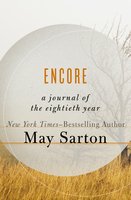 I also read May Sarton’s journal entitled Encore: A Journal of the Eightieth Year (W. W. Norton & Company, 1993) and she was still in the big house in York, Maine with too many papers to sort through and a huge house and garden to look after. She didn’t reach that hopeful state of “neat and tidy.”
I also read May Sarton’s journal entitled Encore: A Journal of the Eightieth Year (W. W. Norton & Company, 1993) and she was still in the big house in York, Maine with too many papers to sort through and a huge house and garden to look after. She didn’t reach that hopeful state of “neat and tidy.”
The definition of the Spirit of the Island flower essence I created, Rhododendron, says: “Nothing is every finished or tidied up; there is simply a pause for reflection until the next stage. The essence encourages and supports that reflective pause. When daily busyness, noise and distractions threaten to overwhelm, the Rhododendron essence offers an antidote: a sacred hoop for us to be gentle with ourselves and to listen to our own inner voice.”
And isn’t that what we need, rather than the constant struggle for some sense of order.
Impermanence
During the first month she was seventy, May mused: “I suppose I have always believed that one must live as though one were dying – and we all are, of course – because then the priorities become clear.” She had been talking to her plumber, Mr. Webster, whose wife had cancer and they had decided to do all the things they had been planning to do “some day.”
There’s nothing like cancer to remind us that we’ll all die, maybe soon, maybe later. I read Natalie Goldberg’s memoir lately, Let the Whole Thundering World Come Home (Shambhala, 2018), in which she writes of having had cancer. In the section entitled, Closer to Death, she writes: How to make the best of my time left?
It’s a question I ponder as well because although I don’t have cancer now, it can appear so suddenly. Also, I’m aging and have the sense that I’d like to simplify things. I like to think I can learn from what Natalie wrote: “In this moment, I use the truth of death to my advantage, as leverage, an edge into this delicious present. How many more?”
May Sarton died in 1995. If she had known she had just over a decade left, would she have lived any differently?
What is Success?
As for being a writer, May wrote: “I have shied away from my peers, partly because writing, as a trade, is so competitive, and I am a bad loser. Any meeting with a successful writer opens wounds.”
To the rest of us, she looks very successful due to the number of books of poetry, novels and journals she published. And she made a living from her writing. She was able to rent a big house and pay people to help with household tasks as she became less able to do them herself. But she always regretted not having her work reviewed in the New York Times for instance.
As she said in her later journal, written in her eightieth year: “I feel more and more sure that I escaped a lot of trouble by not being famous at all until very late in my life and having had nothing whatever to do with the literary establishment. That was the decision I made when I went to Nelson [New Hampshire]: that I would not go to them. They had ignored and treated me badly – but someday they would come to me. Someday is now, and they are coming to me.”
My own idea of success is the fact I left my office job when I was fifty and spent more time writing and offering women’s writing circles. Having time is a great gift and I’m thankful I’ve been able to enjoy creating my own schedules for twenty years.
May Sarton did have “famous” poets among her friends. After they died, she mourned their passing. Louise Bogan and Muriel Ruykeyser were among them.
And now, the time is especially precious for reflection. I’m calling it a memoir but what I’m writing right now is more like a container where I can keep reflections on the memorabilia I’ve been going through. As May says at the beginning of her journal: “In the middle of the night things well up from the past that are not always cause for rejoicing – the unsolved, the painful encounters, the mistakes, the reasons for shame or woe. But all, good or bad, painful or delightful, weave themselves into a rich tapestry, and all give me food for thought, food to grow on.”
Although poet Lorna Crozier has won many awards (Lorna is now seventy as well), I love what she had to say in the Margaret Laurence lecture she gave in 2013: “When you look back on your life as a writer, what you’ll regret is not the awards that passed you by, the grants you didn’t receive, or the stature of your literary reputation. What you’ll regret is that you didn’t pay attention. When I think of my disregard, my distraction, I ache inside. I’d go back, even to the unhappy times, if I could mark the quality of the light trapped in our high pantry window in the run-down house where I grew up, the lines around my father’s mouth as he drew in the smoke from his cigarette the morning he didn’t go to work and waited, until after breakfast to tell my mother he’d lost his job. The hundreds of stories they passed across the table like salt, in good times and bad, and I let them slip by as if someone else was gathering them for me, keeping them as my mother saved old photos in a shoe box.”
“There is no recompense — nothing you or I can do – except pay attention now. I f I were asked, right this minute, to draw my husband’s feet, would I get them right?”
The Self Who Writes
Journal of a Solitude, published in 1973, became very popular due to its reflective nature. It does seem in At Seventy that May is never catching up. She writes: “It is quite a joke that I conceived of this journal as a peaceful, reflective one, and instead it is the record of a runner who never catches up with herself, although that self is the real goal.”
I have the same sense at times and it’s not the life I want i.e. that never catching up. Instead, I’m wanting to go where the energy is and where there’s a sense of flow. I find that things get done smoothly and efficiently and joyfully when I approach them that way. There is always the need on my part to create some order out of things but perhaps more than order, it’s a desire to reflect, to look back. And that’s where the “self” comes in that May mentions.
Eve Joseph said: “Writing is a way back to the self.” Other writers have said the same thing and it’s something to which May Sarton could relate. (Eve Joseph is pictured in the photo to the left.)
Following a visit from a friend for a few days May wonders: “Why then, with such a beneficent presence here, do I get up so exhausted? Because the inner life comes to a complete stop. The self who writes, thinks, gardens, the solitary compulsive is temporarily absent. And I miss her.”
She writes: “What kept me going was, I think, that writing for me is a way of understanding what is happening to me, of thinking hard things out. I have never written a book that was not born out of a question I needed to answer for myself. Perhaps it is the need to remake order out of chaos over and over again. For art is order, but is made out of the chaos of life.”
“So what is the inward order that makes it possible to shut the chaos around me as I sit here? Perhaps a strong sense of what my priorities are – first friends, then work, then the garden. If I died suddenly, how bitterly I should regret work undone, friends unanswered. As for the garden, that is my secret extravagance and one has to have one!”
Real Things at Home
 “Adventures may be for the adventurous, but home is where the real things are sown and reaped, where in the end the real things happen,” May wrote. I agree, that home is where the real things happen and it’s where, if I’ve had adventures elsewhere, I come to reflect on them and integrate them into my life.
“Adventures may be for the adventurous, but home is where the real things are sown and reaped, where in the end the real things happen,” May wrote. I agree, that home is where the real things happen and it’s where, if I’ve had adventures elsewhere, I come to reflect on them and integrate them into my life.
These days, I’m like the narrator in MJ Burrows’ poem “At 65 what I know” featured in my last blog:
I like to travel
and anxious when I leave home.
Never Catching Up
“A runner who never catches up with herself” is how May referred to herself in one of the quotes above. Her “success” in later life led to a constant stream of correspondence from readers and also from many friends. She took the time to answer the letters. “I wrote ten or more letters in the morning and then hoped in the afternoon to get my desk into some sort of order, as it is the wild piles that make me feel wild and disorderly myself. It proved to be an impossible task, as the more I dig into the piles, the more I was appalled at what I should have answered weeks ago.”
Someone printed a form letter she could use but she found it hard to use compared to the individualized letters she wrote. “After all, at seventy not only do I have many readers who want to tell me their stories (always interesting) but, at seventy, I have accumulated many friends. So the bulk of what is on my desk is not ‘fan mail’ but letters from real friends. I suppose my address book has a thousand names in it, and I write to everyone at least once a year and often many times more. So what is the solution? There is none. And that is what makes me feel overcrowded and uneasy at the end of this much interrupted summer.”
Still, there’s something in each mail that “makes me rejoice to be alive and grateful that the books are reaching people and are proving useful,” she wrote.
The Need for Solitude
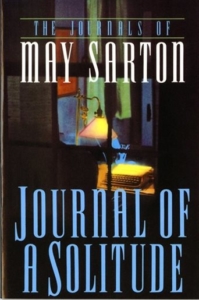 Writers need solitude in which to work which may not be putting pen to paper or fingers on keyboard at all. It’s all that musing time that’s required. Although May had lived with a partner in the past (she mentions going to visit her former partner Judy Matlack who died later that year), she was on her own. To have company, friends would come for a meal or to stay a few days.
Writers need solitude in which to work which may not be putting pen to paper or fingers on keyboard at all. It’s all that musing time that’s required. Although May had lived with a partner in the past (she mentions going to visit her former partner Judy Matlack who died later that year), she was on her own. To have company, friends would come for a meal or to stay a few days.
“Once more I realize acutely that solitude is my element, and the reason is that extreme awareness of other people (all naturally solitary people must feel this) precludes awareness of one’s self, so after a while the self no longer knows that it exists. It is also, of course, that I am fully myself perhaps only when I am creating something. I don’t know how I have managed to keep at this journal, a minor kind of creation but that I have done, and today I have shoved aside the pile of letters, put them out of sight, after writing twenty-five yesterday and the day before and having to face once more that I can never come to the end, however hard I try. I must get back to my own life whether everyone gets an answer or not!”
In October of the year she was seventy, May had been invited to dinner but found “that a dinner engagement takes the edge off the next morning’s work. It seems absurd, but the fact is that good writing takes a certain kind of psychic energy. To summon it each morning, I must wake unblurred, rested, ‘one-pointed,’ as the Japanese say.”
A Perpetual Holiday
“Mine must seem like a perpetual holiday,” May wrote. It may seem that way as for those of us who work at home, we can meet friends for lunch, run errands during the day and work at night. May worked hard though. All those letters to answer and books to write. Even the journal she was writing about being seventy was a project that needed to be kept up and edited before publication and then promoted afterwards.
I’d like to give up the pressure and go where there is flow. A friend asked me when my voice was the least “unfettered.” I mentioned improv as I’ve attended many classes since the fall. It’s in the moment with no need to tidy and create order. It’s all about listening to the person in front of you and paying attention.
In a couple of days I’ll be seventy-one, and the reflections will continue as I enter my seventy-second year. I’m appreciating the title of a new book by Parker J. Palmer that I haven’t read yet: On the Brink of Everything.




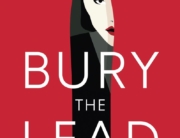


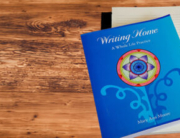

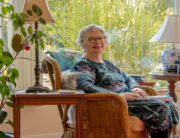



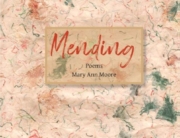

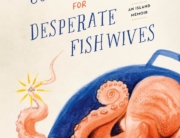


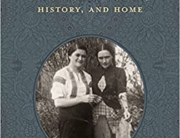


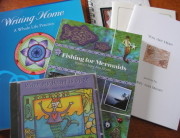
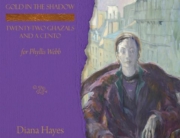


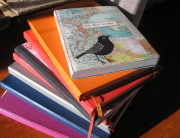
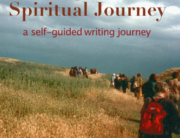
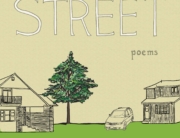



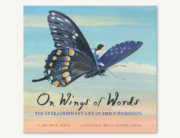

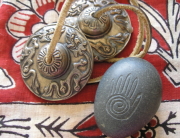
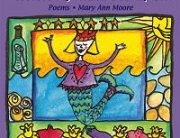
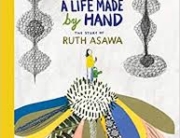
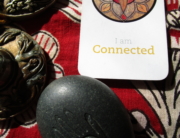
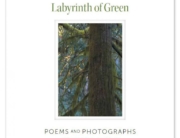

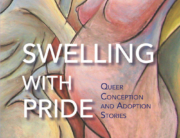
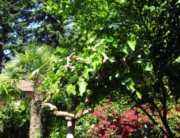
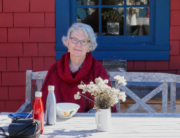

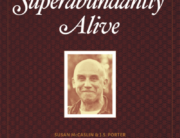

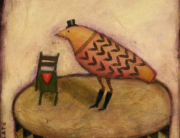


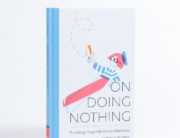


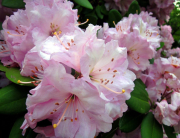
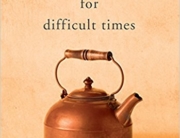

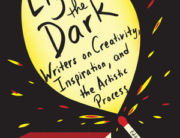

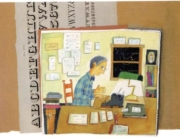






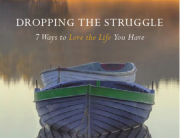













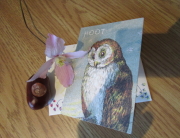

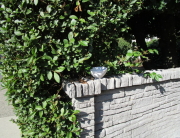
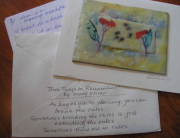




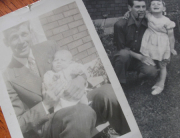









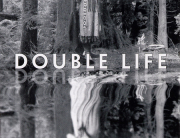

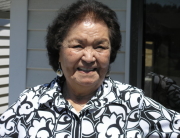
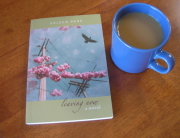




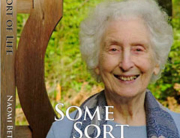

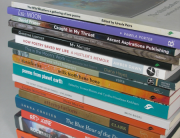

What a thoughtful blog, Mary Ann. I love the points of reflection, so essential at this age, on a full life and the changing rhythms… what to finish, what to let go, where to place attention, what is important, what gives us joy NOW.
I think you meant to write Parker J. Palmer for the final book reference?
Much to contemplate as i look at my wall of journals and, like you, do not want to leave them for others to sort through after I am gone!
You’re right Andrea: Parker J. Palmer. I’ve corrected that. Thanks for reading right to the end!
My goodness, I always get so much from your posts. Thank you so much.